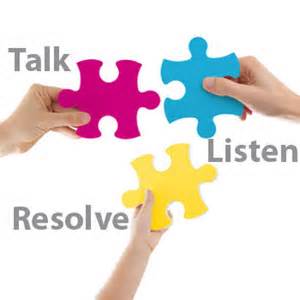 Mediation is an attempt to help parties in a disagreement to hear one another, to minimize the harm that can come from disagreement (e.g. hostility or ‘demonizing’ of the other parties) to maximize any area of agreement, and to find a way of preventing the areas of disagreement from interfering with the process of seeking a compromise or mutually agreed outcome.
Mediation is an attempt to help parties in a disagreement to hear one another, to minimize the harm that can come from disagreement (e.g. hostility or ‘demonizing’ of the other parties) to maximize any area of agreement, and to find a way of preventing the areas of disagreement from interfering with the process of seeking a compromise or mutually agreed outcome.
Mediation is a voluntary and confidential process in which a neutral third-party facilitator helps people discuss difficult issues and work towards an agreement. Basic steps in the process include gathering information, framing the issues, developing options, negotiating, and formalizing agreements. Parties in mediation create their own solutions and the mediator does not have any decision-making power over the outcome.
Most people are not familiar with the mediation process. They become interested when they find themselves facing a dispute between themselves and another party. Or, a court has mandated mediation prior to an actual court proceeding or if mediation is mandated through contract language.
The final settlement agreement may be used as a legal document and can be enforced in a court of law. (All parties have the opportunity to have anything they agree to or want to sign reviewed by an attorney – prior to signing it.)
What Types of Disputes Can Be Addressed Through Mediation?
Conflict resolution can be used to help resolve almost any type of dispute. Family mediators, for example, help people with divorce, custody issues, parent-child or sibling conflicts, eldercare issues, family business concerns, adoption, premarital agreements, neighbor disputes, etc. Other types of conflicts that respond well to alternative dispute resolution include workplace disputes, labor/management issues, environmental/public policy issues, health care disputes, international conflicts, and many others.
What Are the Benefits of Mediation?
Mediation allows parties to maintain greater control of their lives and make their own decisions. The process fosters understanding, cooperation, and agreements that work for both parties. It usually costs less money and takes less time than litigation, and compliance with agreements is often higher than with court-imposed judgments. Another primary benefit is privacy. The process is confidential, allowing parties to avoid public disclosure of sensitive information in the courts.
Who are Mediators?
The mediator’s role is not to decide who is right or who is wrong, but to facilitate discussions between the parties to help them reach a settlement that is fair and equitable to both parties.
-
Are community members and professionals trained in conflict resolution techniques.
-
Help people identify their needs, clarify issues, explore solutions, find common ground and negotiate resolutions.
-
Do not take sides with either party; and
-
Do not render a decision or judgment.
Mediated cases have an 88% compliance rate.
Court cases report about 42% compliance with the court ordered agreement.
Even when resolution is not reached, Judges prefer to hear mediated cases because the disputants have a better idea of what a good settlement for them is.
Mediation Model Types:
- Facilitative = Facilitates the communication by way of a process that assists the parties in reaching agreement. Offers no recommendations, no opinions, no advice, and no predictions of court decisions. Mediators are in charge of the process, parties are in charge of the outcome.
- Narrative = Allowing the parties to tell their stories and write new stories of resolution of the conflict. This is very different than typical mediation.
- Inclusive = Listening for values, feelings and topics and reflect back to the parties what they are hearing. Follows a defined process that allows for parties to share the situation, build clarity, identify topics, identify goals, brainstorm options, and determine areas of agreement and goals reached – if any.
- Transformative = focuses on interpersonal processes – empowerment and recognition. Mediators empower the parties to make their own decisions and take their own actions. They also work to develop recognition between the parties. Parties are in charge of the content (substantive issues,) and the process.
- Evaluative = Mediation is based on legal rights and typical courses a judge may take when making a decision/negotiation in the case. Most often this is facilitated by attorneys.